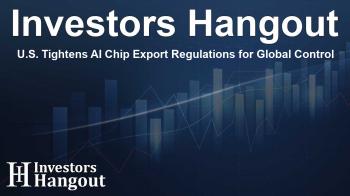U.S. Tightens AI Chip Export Regulations for Global Control

U.S. Tightens AI Chip Export Regulations for Global Control
In a strategic move to maintain its dominance in artificial intelligence, the U.S. government has announced stricter regulations regarding the export of AI chips and related technologies. This initiative aims to curb China's access to advanced computing capabilities while strengthening alliances with close partners.
New Export Regulations Explained
The newly introduced regulations place a cap on AI chip exports to various nations, creating a structure where America's closest allies will enjoy unlimited access to U.S. technology. In contrast, adversarial nations such as China, Russia, Iran, and North Korea are subjected to stringent limits. This approach represents a significant expansion of the Biden administration's previous initiatives to curb China's technological advancements by enhancing military capacities through AI.
Why the Regulations Matter
U.S. Commerce Secretary Gina Raimondo emphasized the critical nature of these regulations, stating, "The U.S. leads AI now - both in development and chip design, and it's vital that we maintain this lead." This regulatory framework is designed to ensure the United States retains its position as a global leader in AI technology.
Implications for AI Chip Manufacturers
The new guidelines will particularly impact advanced graphics processing units (GPUs), essential components in data centers for training AI models. Nvidia and Advanced Micro Devices, both leading players in the AI chip market, will need to navigate these restrictions carefully. Major cloud service providers like Microsoft, Google, and Amazon are also expected to adapt their strategies in response to these changes.
Global Authorizations and Conditions
Under the new structure, companies that wish to build data centers and work with AI technology will be able to seek global authorizations, exempting their projects from certain country quotas on AI chips. However, these companies will face tight regulations and conditions aimed at ensuring national security and respect for human rights.
Industry Reactions to the New Rules
The announcement of the new regulations has sparked concerns among industry leaders. Nvidia described these measures as "sweeping overreach," warning that they could inadvertently restrict access to technology widely used in consumer products. Oracle has also expressed fears that these rules might give an upper hand to Chinese competitors in the AI and GPU market.
New Licensing Requirements
One notable aspect of the regulations is the global licensing requirements imposed on certain types of AI chips. This includes controls on what are termed "model weights," which are vital for decision-making in machine learning processes. The division of countries into different tiers based on their access to technology further underscores the U.S. government's strategic position.
Tier Classification of Countries
The regulations categorize the global landscape into three distinct tiers. Approximately 18 countries, including Japan and the UK, will be mostly exempt from these rules, allowing for greater collaboration in AI development. In contrast, around 120 other nations, such as Singapore, will face quotas limiting their access to U.S. AI technology. Nations under arms embargo, including China and Russia, will be entirely restricted from receiving any U.S. technology.
Future Prospects and National Security
As AI continues to evolve, its potential to benefit various sectors, including healthcare and education, remains significant. However, there are concerns about its misuse in crafting weapons or conducting surveillance. National Security Adviser Jake Sullivan has highlighted the necessity for the U.S. to prepare for rapid advancements in AI, emphasizing the potential impacts on both the economy and national security.
Frequently Asked Questions
What are the main changes in the U.S. AI chip export regulations?
The new regulations cap AI chip exports to many countries while allowing unlimited access for U.S. allies, focusing on restricting China and other adversaries.
How do these regulations affect AI chip manufacturers?
Manufacturers like Nvidia and AMD will need to adapt to stricter licensing and export limits under the new regulations.
Are there exemptions for any countries under these new regulations?
Yes, certain countries, including Japan and the UK, are largely exempt from these rules, facilitating smoother collaborations.
What are the potential benefits of AI technology?
AI has the potential to improve healthcare, education, and other critical areas, but there are also risks related to its misuse.
What role does U.S. national security play in these regulations?
National security concerns drive the need for these tight regulations to prevent adversaries from leveraging advanced AI capabilities.
About Investors Hangout
Investors Hangout is a leading online stock forum for financial discussion and learning, offering a wide range of free tools and resources. It draws in traders of all levels, who exchange market knowledge, investigate trading tactics, and keep an eye on industry developments in real time. Featuring financial articles, stock message boards, quotes, charts, company profiles, and live news updates. Through cooperative learning and a wealth of informational resources, it helps users from novices creating their first portfolios to experts honing their techniques. Join Investors Hangout today: https://investorshangout.com/
Disclaimer: The content of this article is solely for general informational purposes only; it does not represent legal, financial, or investment advice. Investors Hangout does not offer financial advice; the author is not a licensed financial advisor. Consult a qualified advisor before making any financial or investment decisions based on this article. The author's interpretation of publicly available data shapes the opinions presented here; as a result, they should not be taken as advice to purchase, sell, or hold any securities mentioned or any other investments. The author does not guarantee the accuracy, completeness, or timeliness of any material, providing it "as is." Information and market conditions may change; past performance is not indicative of future outcomes. If any of the material offered here is inaccurate, please contact us for corrections.
